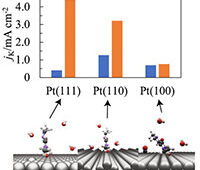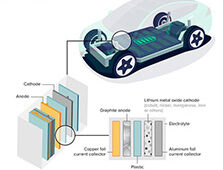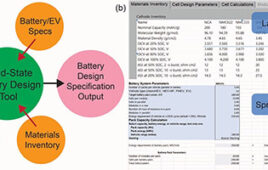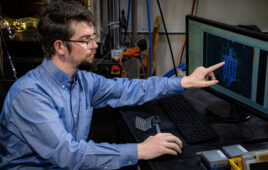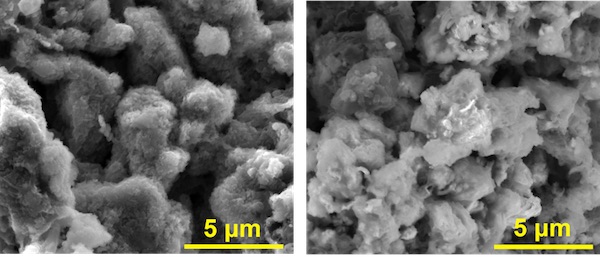
Scanning electron microscope images show an anode of asphalt, graphene nanoribbons and lithium at left and the same material without lithium at right. The material was developed at Rice University and shows promise for high-capacity lithium batteries that charge 20 times faster than commercial lithium-ion batteries. Courtesy of the Tour Group/ Rice University
Asphalt may hold the key to unlocking the high capacity of lithium metal batteries.
Rice University researchers have found that a small amount of asphalt may allow lithium metal batteries to charge 10-to-20 times faster than commercial lithium-ion batteries.
The researchers developed anodes— comprising of porous carbon from asphalt— that showed stability after more than 500 charge-discharge cycles and a high-current density of 20 milliamps per square centimeter, demonstrating the material’s promise for use in rapid charge and discharge devices that require high-power density.
“The capacity of these batteries is enormous but what is equally remarkable is that we can bring them from zero charge to full charge in five minutes, rather than the typical two hours or more needed with other batteries,” Rice chemist James Tour said in a statement.
The researchers mixed asphalt with conductive graphene nanoribbons and coated the composite with lithium metal through electrochemical deposition.
The anode was combined with a sulfurized-carbon cathode to make full batteries for testing. After testing, the batteries showed a high-power density of 1,322 watts per kilogram and high-energy density of 943 watt-hours per kilogram.
The researchers also found that the carbon mitigated the formation of lithium dendrites—the mossy deposits invade a battery’s electrolyte and if extended far enough will short-circuit the anode and cathode and can cause the battery to fail, catch fire or explode.
“While the capacity between the former and this new battery is similar, approaching the theoretical limit of lithium metal, the new asphalt-derived carbon can take up more lithium metal per unit area and it is much simpler and cheaper to make,” Tour said. “There is no chemical vapor deposition step, no e-beam deposition step and no need to grow nanotubes from graphene, so manufacturing is greatly simplified.”
The study was published in ACS Nano.

